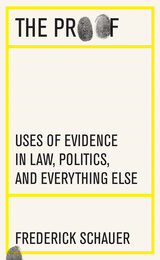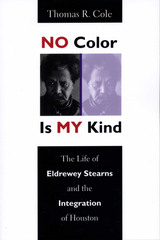
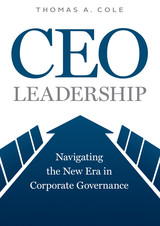
Drawing on four decades of experience advising boards and CEOs on how to do just that, Thomas A. Cole offers in CEO Leadership a straightforward and accessible guide to navigating corporate governance today. He explores the recurring question of whose benefit a corporation should be governed for, along with related matters of corporate social responsibility, and he explains the role of laws, market forces, and politics and their influence on the governance of public companies. For corporate directors, he provides a comprehensive examination of the roles, responsibilities, and accountability the role entails, while also offering guidance on how to be as effective as possible in addressing both routine corporate matters and special situations such as mergers and acquisitions, succession, and corporate crises. In addition, he offers practical suggestions for CEOs on leadership and their interactions with boards and shareholders. Cole also mounts a compelling case that a corporate culture that celebrates diversity and inclusion and has zero tolerance for sexual misconduct is critical to long-term business success.
Filled with vignettes from Cole’s many years of experience in the board room and C-suite, CEO Leadership is an invaluable resource for current and prospective directors, CEOs, and other senior officers of public companies as well as the next generation of corporate leaders and their business and financial advisors.
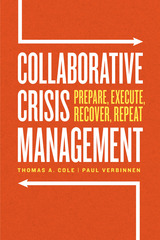
All organizations face crises from time to time, and at a time when news, information (or misinformation), and rumors can spread quickly, a timely and thoughtful response to a crisis, is critical. In this book, two industry insiders offer a primer on how organizational leadership should prepare for and handle crises. The steps, plans, and cautions they offer show how organizations can deal openly and honestly with challenges while continuing to survive and prosper.
Thomas A. Cole and Paul Verbinnen show how successful crisis management requires a multi-disciplined approach enacted collaboratively under strong leadership. Drawing on many real-world examples, they speak to not only what to do during a crisis, but also the need for preparedness and post-crisis follow-up. The book is organized around a broad range of discrete issues that need to be addressed in managing any crisis and provides the steps required to successfully address each of those issues. The authors urge crisis managers to focus attention equally on four phases of management: prepare, execute, recover, and then repeat (after reflecting on the results of the last crisis) with the next one. The emphasis is on preparation and planning, setting up the procedures, and organizing the teams that will respond to each crisis.
Unlike other crisis books that focus solely on communication, Collaborative Crisis Management goes further and in addition to communication, it discusses both the legal obligations and organizational challenges that accompany a crisis. The result is an indispensable guide for leaders, board members, and business students.
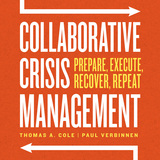
Two experienced corporate crisis advisors offer a thorough and approachable guide to successful crisis management from anticipation to resolution.
All organizations face crises from time to time, and at a time when news, information (or misinformation), and rumors can spread quickly, a timely and thoughtful response to a crisis, is critical. In this book, two industry insiders offer a primer on how organizational leadership should prepare for and handle crises. The steps, plans, and cautions they offer show how organizations can deal openly and honestly with challenges while continuing to survive and prosper.
Thomas A. Cole and Paul Verbinnen show how successful crisis management requires a multi-disciplined approach enacted collaboratively under strong leadership. Drawing on many real-world examples, they speak to not only what to do during a crisis, but also the need for preparedness and post-crisis follow-up. The book is organized around a broad range of discrete issues that need to be addressed in managing any crisis and provides the steps required to successfully address each of those issues. The authors urge crisis managers to focus attention equally on four phases of management: prepare, execute, recover, and then repeat (after reflecting on the results of the last crisis) with the next one. The emphasis is on preparation and planning, setting up the procedures, and organizing the teams that will respond to each crisis.
Unlike other crisis books that focus solely on communication, Collaborative Crisis Management goes further and in addition to communication, it discusses both the legal obligations and organizational challenges that accompany a crisis. The result is an indispensable guide for leaders, board members, and business students.

Ancient metricians saw Greek verse in essentially paradigmatic terms, as a mosaic of discrete feet or phrases, each with its own name and each conforming, within a permitted range of variation, to some fixed model. The syntagmatic alternative to this view offered here represents the first attempt since the early nineteenth century to make a decisive break with inherited metrical categories and assumptions. It argues that feet and phrases, to the extent that they exist at all in Greek lyric verse, tend to be present at the level of parole rather than langue—constituting one of a number of possible ways of articulating some larger rhythmical continuum. These larger rhythmical structures, comparable to the movements of a piece of Classical Western music but allowing for a more fluid bar structure, a greater variety of basic time signatures, and more frequent modulation, are the minimal independent utterances in lyric discourse.
Recognition of their existence and character allows a reduction of the bewildering multiplicity of rhythmical nomenclature to something much more simple and manageable, as well as a clearer view both of the architectonics of the Greek stanza and of the main lines of its development during the three centuries (700–400 B.C.) when rhythmical innovation and experimentation were at their height. The organization of the book is partially by genres, partially historical; its use in the study of individual passages is facilitated by a full index locorum.

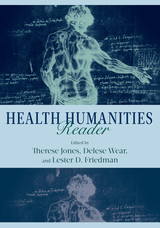
In Health Humanities Reader, editors Therese Jones, Delese Wear, and Lester D. Friedman have assembled fifty-four leading scholars, educators, artists, and clinicians to survey the rich body of work that has already emerged from the field—and to imagine fresh approaches to the health humanities in these original essays. The collection’s contributors reflect the extraordinary diversity of the field, including scholars from the disciplines of disability studies, history, literature, nursing, religion, narrative medicine, philosophy, bioethics, medicine, and the social sciences.
With warmth and humor, critical acumen and ethical insight, Health Humanities Reader truly humanizes the field of medicine. Its accessible language and broad scope offers something for everyone from the experienced medical professional to a reader interested in health and illness.
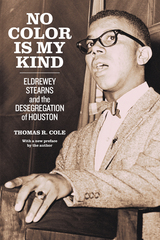
In 1959, a Black man named Eldrewey Stearns was beaten by Houston police after being stopped for a traffic violation. He was not the first to suffer such brutality, but the incident sparked Stearns’s conscience and six months later he was leading the first sit-in west of the Mississippi River. No Color Is My Kind, first published in 1997, introduced readers to Stearns, including his work as a civil rights leader and lawyer in Houston’s desegregation movement between 1959 and 1963. This remarkable and important history, however, was nearly lost to bipolar affective disorder. Stearns was a fifty-two-year-old patient in a Galveston psychiatric hospital when Thomas Cole first met him in 1984. Over the course of a decade, Cole and Stearns slowly recovered the details of Stearns’s life before his slide into mental illness, writing a story that is more relevant today than ever.
In this new edition, Cole fills in the gaps between the late 1990s and now, providing an update on the progress of civil rights in Houston and Stearns himself. He also reflects on his tumultuous and often painful collaboration with Stearns, challenging readers to be part of his journey to understand the struggles of a Black man’s complex life. At once poignant, tragic, and emotionally charged, No Color Is My Kind is essential reading as the current movement for racial reconciliation gathers momentum.

Barbara Myerhoff's groundbreaking work in reflexivity and narrative ethnography broke with tradition by focusing not on the raw ethnographic data, but on her interaction with those she studied. Myerhoff's unfinished projects, including her final talks on storytelling, ritual, and the "culture of aging and Yiddishkeit," offer a magisterial summary of her life's work.
"The beauty of Stories as Equipment for Living is the quality of being a compilation of rescued fragments, bits and pieces of a great master's writing and thinking that were coming towards synthesis but had never reached a finished form prior to her death. This collection is an examination of the place of narrative in human life, the synthetic nature of culture and the constant search for visibility particularly by those relegated for one reason or another to the margins. A thought-provoking book worthy of extended reflection."
---Jack Kugelmass, Professor of Anthropology and Director of Jewish Studies, University of Florida
"Stories as Equipment for Living achieves a nice balance between preserving Myerhoff's work in its original form and reconstructed contexts, but presenting it in a manner relevant to readers a generation after her death. The book documents Myerhoff's growing involvement with Jewish culture, the actual process of anthropological work through field notes, and the picture of how she always was bouncing the fine details of this combined professional and personal venture off the 'big questions' of anthropology in its broadest sense."
---Harvey E. Goldberg, Professor of Sociology and Anthropology, Hebrew University, Israel
"These essays capture the rhythm of Barbara Myerhoff's words and her vivid and distinctive train of thought, bringing the reader into the classroom of one of anthropology's finest lecturers. As an anthropologist with a poet's gift for language, she utilizes the tools of ethnography and extraordinary powers of observation---a remarkable 'ethnographic eye'---to explore the outward expressions and inner lives of the Fairfax neighborhood of L.A. These stories are not only glorious introductions to the study of culture, but provide in their revelations a reason for studying it. They are required reading for anyone passionate to know what an anthropologist can teach us about communities and ultimately about ourselves."
---Steve Zeitlin, Director, City Lore: The New York Center for Urban Folk Culture
"Master of the third voice, the voice of collaboration, Myerhoff is at once a consummate listener and inspired storyteller. This book offers a rare and luminous opening into the working process and wisdom of one of the great anthropologists of the twentieth century."
---Barbara Kirshenblatt-Gimblett, Professor of Performance Studies at New York University and coauthor of They Called Me Mayer July: Painted Memories of a Jewish Childhood in Poland Before the Holocaust
"Myerhoff and her collaborators have given her 'Hasidim,' her disciples old and new, a final and precious gift."
---Jonathan Boyarin, The Robert M. Beren Distinguished Professor of Modern Jewish Studies at the University of Kansas and author of Thinking in Jewish
Barbara Myerhoff was a renowned anthropologist who did pioneering work in gerontology, Jewish studies, folklore, and narrative anthropology. She is best known for her ethnography of and personal involvement with a community of elderly immigrant Jews in California. Her writings and lectures have had an enormous impact on all of these areas of study, and her books are widely celebrated, especially Number Our Days, whose companion documentary film won an Academy Award.
Marc Kaminsky is a psychotherapist, a poet, a writer, and the former codirector of the Institute on Humanities, Arts and Aging of the Brookdale Center on Aging.
Mark Weiss is a writer, an editor, a translator, and a poet; his books include the widely praised Across the Line/Al Otro Lado.
Deena Metzger is a novelist, a poet, and the founding codirector (with Marc Kaminsky) of the Myerhoff Center.
Thomas R. Cole is the Beth and Toby Grossman Professor and Director of the McGovern Center for Health, Humanities, and the Human Spirit at the University of Texas Health Science Center in Houston, and a Professor of Humanities in the Department of Religious Studies at Rice University; his expertise lies in the history of aging and humanistic gerontology.

READERS
Browse our collection.
PUBLISHERS
See BiblioVault's publisher services.
STUDENT SERVICES
Files for college accessibility offices.
UChicago Accessibility Resources
home | accessibility | search | about | contact us
BiblioVault ® 2001 - 2024
The University of Chicago Press


